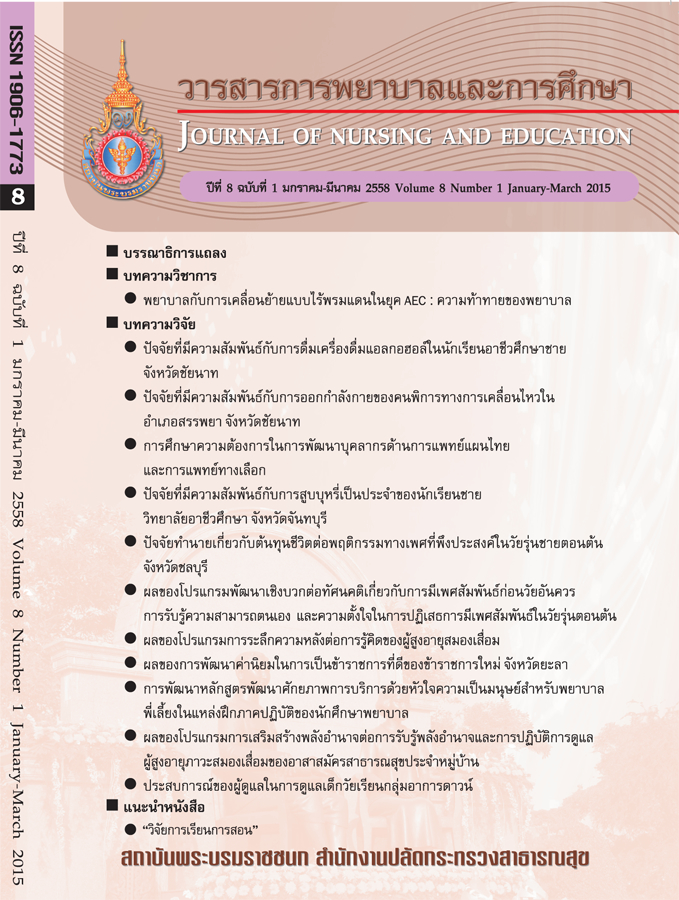การพัฒนาหลักสูตรพัฒนาศักยภาพการบริการด้วยหัวใจ ความเป็นมนุษย์สำหรับพยาบาลพี่เลี้ยงในแหล่งฝึกภาคปฏิบัติ ของนักศึกษาพยาบาล
คำสำคัญ:
preceptor, humanized care, transformative learningบทคัดย่อ
บทคัดย่อการวิจัยและพัฒนาเรื่องการพัฒนาหลักสูตรพัฒนาศักยภาพการบริการด้วยหัวใจความเป็นมนุษย์สำหรับพยาบาลพี่เลี้ยงในแหล่งฝึกภาคปฏิบัติของนักศึกษาพยาบาล มีวัตถุประสงค์เพื่อพัฒนาหลักสูตรพัฒนาศักยภาพการบริการด้วยหัวใจความเป็นมนุษย์สำหรับพยาบาลพี่เลี้ยงในแหล่งฝึกภาคปฏิบัติของนักศึกษาพยาบาลของวิทยาลัยพยาบาลบรมราชชนนี ราชบุรี มีวัตถุประสงค์เฉพาะเพื่อ 1) ศึกษาศักยภาพการบริการด้วยหัวใจความเป็นมนุษย์ของพยาบาลพี่เลี้ยงในแหล่งฝึกภาคปฏิบัติของนักศึกษาพยาบาล 2) พัฒนาหลักสูตรพัฒนาศักยภาพการบริการด้วยหัวใจความเป็นมนุษย์ของพยาบาลพี่เลี้ยงในแหล่งฝึกภาคปฏิบัติของ
นักศึกษาพยาบาล และ 3) ศึกษาผลการพัฒนาศักยภาพการบริการด้วยหัวใจความเป็นมนุษย์ของพยาบาลพี่เลี้ยงในแหล่งฝึกภาคปฏิบัติของนักศึกษาพยาบาล มีวิธีการดำเนินการวิจัย 3 ขั้นตอนดังนี้ ระยะที่ 1
การศึกษาศักยภาพการบริการด้วยหัวใจความเป็นมนุษย์ของพยาบาลพี่เลี้ยงในแหล่งฝึกภาคปฏิบัติของ
นักศึกษาพยาบาล เป็นการวิจัยเชิงบรรยาย กลุ่มตัวอย่างเป็นพยาบาลพี่เลี้ยง 67 คน และผู้ป่วยจำนวน 20 คน ที่ได้รับบริการจากพยาบาลพี่เลี้ยงดังกล่าว ผู้วิจัยเก็บข้อมูลโดยขอให้พยาบาลพี่เลี้ยงตอบแบบสอบถามและดำเนินการสนทนากลุ่ม รวมทั้งสัมภาษณ์ผู้ป่วย เครื่องมือที่ใช้ในการวิจัยคือแบบประเมินศักยภาพการบริการด้วยหัวใจความเป็นมนุษย์ แนวคำถามที่ใช้ในการสนทนากลุ่มพยาบาลพี่เลี้ยง และแนวคำถามที่ใช้ใน การสัมภาษณ์ผู้ป่วย ผลการศึกษาพบว่าพยาบาลพี่เลี้ยงมีคะแนนศักยภาพการบริการด้วยหัวใจมนุษย์ระดับมาก (=3.70, SD=.40) พยาบาลพี่เลี้ยงให้บริการสุขภาพโดยเน้นการให้ความรู้ ยึดผู้ให้บริการเป็นสำคัญ และไม่มีความยืดหยุ่น ผู้ป่วยได้รับบริการที่ยึดมาตรฐานของโรงพยาบาลเป็นหลัก และคำแนะนำซ้ำๆ ที่เป็นไปไม่ได้ ระยะที่ 2 การพัฒนาหลักสูตรพัฒนาศักยภาพการบริการด้วยหัวใจความเป็นมนุษย์ของพยาบาลพี่เลี้ยงในแหล่งฝึกภาคปฏิบัติของนักศึกษาพยาบาล เป็นการวิจัยเพื่อพัฒนาหลักสูตรพัฒนาศักยภาพการบริการด้วยหัวใจความเป็นมนุษย์ ใช้วิธีการพัฒนาหลักสูตร 7 ขั้นตอน ตามแนวคิดของทาบา ผลการวิจัยพบว่า 1) หลักสูตรพัฒนาศักยภาพการบริการด้วยหัวใจความเป็นมนุษย์สำหรับพยาบาลพี่เลี้ยงในแหล่งฝึกภาคปฏิบัติของนักศึกษาพยาบาลเน้นเรื่องจิตบริการ การคิดเชิงวิเคราะห์ และการให้ผู้รับบริการมีส่วนร่วม 2) การพัฒนาศักยภาพการบริการด้วยหัวใจความเป็นมนุษย์สำหรับพยาบาลพี่เลี้ยงในแหล่งฝึกภาคปฏิบัติของนักศึกษาพยาบาลใช้การเรียนรู้เพื่อการปรับเปลี่ยนมโนทัศน์ ระยะที่ 3 การศึกษาผลการพัฒนาศักยภาพการบริการด้วยหัวใจความเป็นมนุษย์ของพยาบาลพี่เลี้ยงในแหล่งฝึกภาคปฏิบัติของนักศึกษาพยาบาล เป็นการวิจัยกึ่งทดลองมุ่งศึกษาศักยภาพการบริการด้วยหัวใจมนุษย์หลังการนำหลักสูตรไปใช้ กลุ่มตัวอย่างคือพยาบาลพี่เลี้ยงในแหล่งฝึกภาคปฏิบัติของนักศึกษาพยาบาลที่เข้ารับการพัฒนาศักยภาพการบริการด้วยหัวใจความเป็นมนุษย์สำหรับพยาบาลพี่เลี้ยงในแหล่งฝึกภาคปฏิบัติของนักศึกษาพยาบาล จำนวน 80 คน โดยให้กลุ่มตัวอย่างตอบแบบประเมินศักยภาพการบริการด้วยหัวใจความเป็นมนุษย์ พบว่าผลการเปรียบเทียบก่อนและหลังการอบรมคะแนนเฉลี่ยคะแนนศักยภาพการบริการด้วยหัวใจความเป็นมนุษย์ของพยาบาลพี่เลี้ยงหลังการอบรมสูงกว่าก่อนการอบรมอย่างมีนัยสำคัญทางสถิติ ( p<0.05) และกลุ่มตัวอย่างเกิดการเรียนรู้คือเข้าใจข้อจำกัดของผู้ป่วย คำแนะนำที่ให้อาจไม่ได้ช่วยผู้ป่วย และปรับแนวทางการบริการ เมื่อเวลาผ่านไป 1 เดือน ผู้วิจัยทำการสนทนากลุ่มกับพยาบาลพี่เลี้ยง 80 คนเพื่อตรวจสอบความคงอยู่ของศักยภาพการบริการด้วยหัวใจความเป็นมนุษย์ พบว่าพยาบาลพี่เลี้ยงสามารถนำความรู้ไปใช้โดยพูดคุยเพื่อเข้าใจบริบทชีวิตของผู้ป่วย ยอมรับ ความจริงเกี่ยวกับผู้ป่วย และไม่ตำหนิผู้ป่วยทำให้ได้ข้อมูลที่เป็นความจริง แต่ยังมีอุปสรรคของการนำ ความรู้ไปใช้คือ ข้อจำกัดของสถานการณ์การบริการสุขภาพ ภาระด้านการบันทึก และความไม่เข้าใจของเพื่อนร่วมงาน ความรู้ที่ได้จากการวิจัยและพัฒนาครั้งนี้สามารถนำไปใช้ในการจัดทำนโยบาย การจัดการศึกษาด้านสุขภาพ และการบริการสุขภาพ
คำสำคัญ : พยาบาลพี่เลี้ยง การบริการด้วยหัวใจความเป็นมนุษย์ การเรียนรู้เพื่อปรับเปลี่ยนมโนทัศน์
Abstract
The research and development on humanized care competencies of preceptors in practicum settings of Boromarajonani College of Nursing Ratchaburi (BCNR) aimed to increase humanized care competencies among the preceptors. The specific objectives were: 1) to explore humanized care
competencies of preceptors in practicum settings, 2) to develop the curriculum of humanized care competencies development for the preceptors in the practicum settings, and 3) investigate humanized care competencies developed among preceptors in the practicum settings. There were three phases in the study. Firstly, the descriptive study of exploring humanized care competencies of preceptors in the practicum settings was conducted. The samples were 67 preceptors and the 20 patients received care provided by those preceptors. The researchers asked the preceptors to complete the questionnaires, conducted the focus groups, and interviewed the patients. The instruments were the Humanized Care Competency Questionnaires, focus group guide, and interview guide. The results showed that mean score of humanized care competencies rated by the preceptors was in the high level (=3.70, SD=.40). The preceptors provided health care focusing on educating, having health care providers oriented, and being inflexible. The patients received health care depending on the hospital standards and
inapplicable guidance. Secondly, the study of curriculum development on humanized care
competencies of the preceptors in the practicum settings was undertaken. The researchers used seven steps of Taba, H. (1962) in developing the curriculum. The results showed; 1) the curriculum
developed emphasized in service mind, analytical thinking, and client participation and 2)
transformative learning concept was used in developing humanized care competencies among
the preceptors. Thirdly, humanized care competencies developed among preceptors of the practicum settings were investigated. The quasi-experimental study aimed to investigate humanized care
competencies developed among preceptors of the practicum settings. The samples were 80 preceptors who enrolled in the training programme of developing humanized care competencies. The researchers asked the preceptors to rate on agreement with the humanized care competencies. The findings showed that the mean score of humanized care competencies after the training programme was significantly higher that it was rated before training (p<0.05). The participants informed that they learn about understanding the limitations of the patients, unhelpful advice, and ways to adjust health care
provided. One month later the researchers conducted the focus groups to see the humanized care competencies remain. The results found that the preceptors utilized the knowledge in terms of talking to the patients to understand the context of patients, accepting the truths relating to the patients, and no prejudging the patients and knowing the truths. However, the obstacles were limitations of health care situations, tasks of recording, being not understood by the colleagues. The knowledge gained from the study can be used in policy making, health education, and health services.
Keywords : preceptor; humanized care; transformative learning






